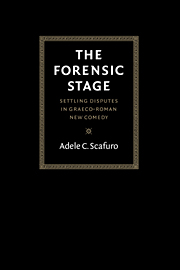Book contents
Author's note on terminology, transliteration, translation, and texts
Published online by Cambridge University Press: 03 March 2010
Summary
Four categories of terminology need to be explained: idiosyncratic usages of the author, periodization, Greek and Latin terms, and conventions of analytic scholarship.
I use “New Comedy” as a blanket term for both Greek New Comedy and Roman Comedy. When I mean to specify the one or the other, I use the ethnic adjective. ‘Analytic scholarship’ refers to the work and methods of those classical philologists who have engaged in the close examination of Latin plays in order to reconstruct the Greek originals, to conjecture Plautine or Terentian originality in their treatment of Greek models, and to diagnose earlier and later accretions to the Latin plays. Other idiosyncratic usages are no doubt present in this book; context or explicit exegesis, I hope, will clarify.
Chronological periodization is, by and large, conventional. In the Greek spectrum, the period of the Attic orators belongs to “classical Athens”; the period of Greek New Comedy belongs to the Hellenistic age, commencing with the death of Alexander the Great (323 BC) and ending with the battle of Actium (31 BC). In the Roman spectrum, the period during which Plautus and Terence wrote is the “mid-Republic”; the “Gracchan revolution” can be used as the commencement of the “late Republic.” Temporal references such as these are always somewhat arbitrary and inaccurate (e.g., at least two poets of Greek New Comedy were writing before the death of Alexander); my purpose in using the ready-made framework is, in the main, to identify a chunk of time, although there is a purposeful, if slight, disputatious point in not lumping together the last two centuries of the Republic into a monolithic slab (see “Introduction”).
- Type
- Chapter
- Information
- The Forensic StageSettling Disputes in Graeco-Roman New Comedy, pp. xv - xviiPublisher: Cambridge University PressPrint publication year: 1997



